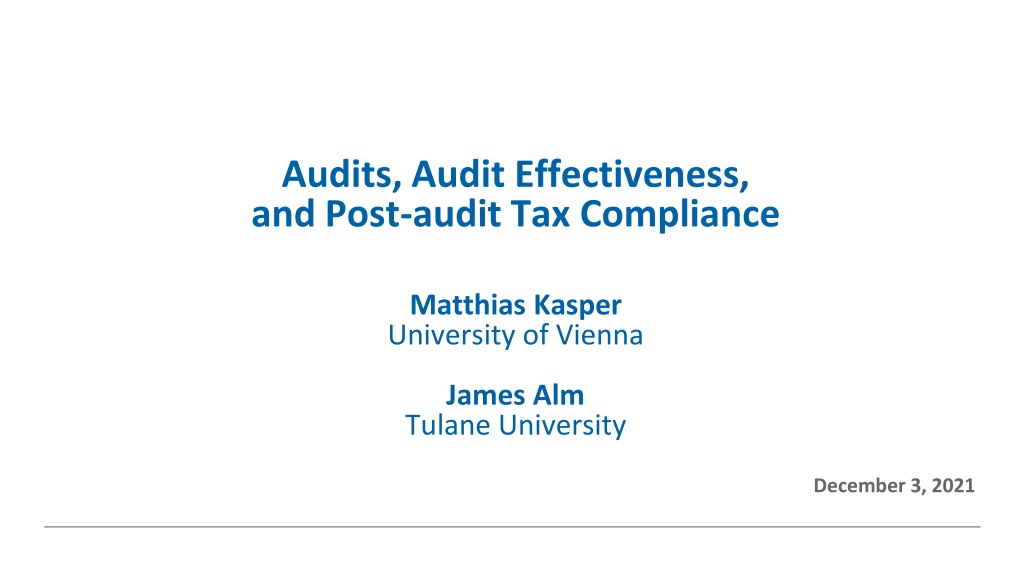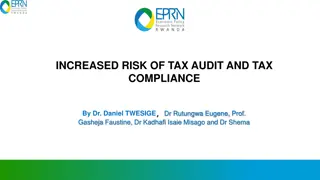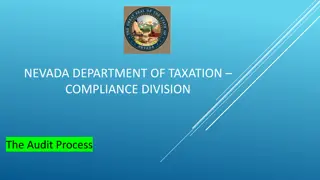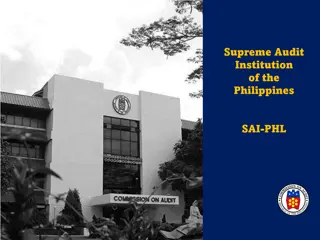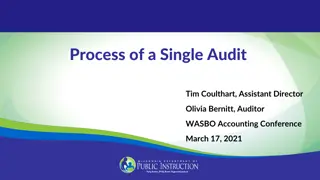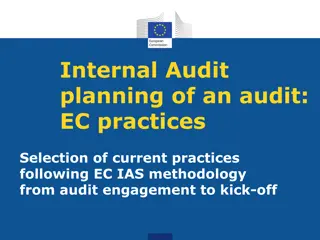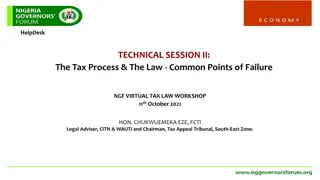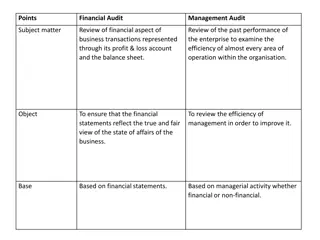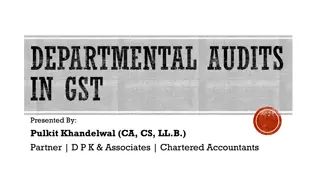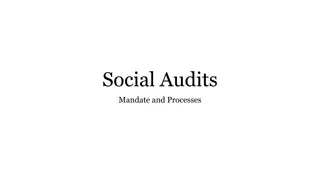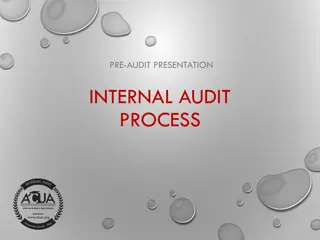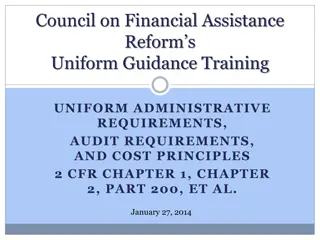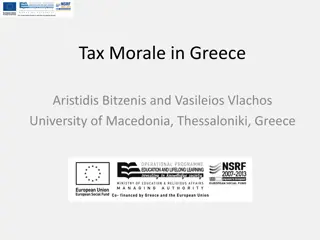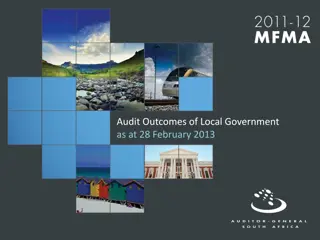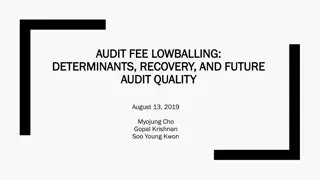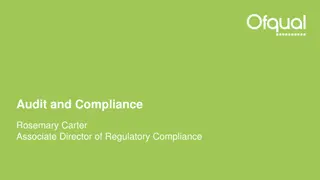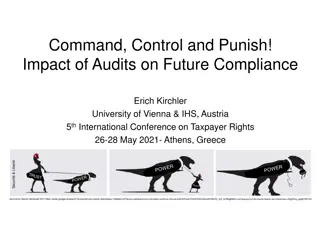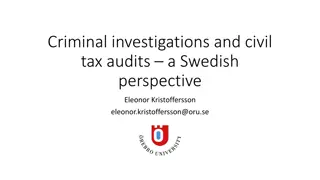Understanding the Impact of Audits on Post-Audit Tax Compliance
Audits have direct and indirect effects on taxpayers, influencing compliance behaviors. While more audits generally lead to increased compliance, outcomes can be ambiguous, with some studies showing a decline in post-audit compliance. Behavioral responses to tax audits are driven by perceived risks of future audits and heuristics used by taxpayers in assessing audit risk and reciprocity concerns.
Download Presentation

Please find below an Image/Link to download the presentation.
The content on the website is provided AS IS for your information and personal use only. It may not be sold, licensed, or shared on other websites without obtaining consent from the author. Download presentation by click this link. If you encounter any issues during the download, it is possible that the publisher has removed the file from their server.
E N D
Presentation Transcript
Audits, Audit Effectiveness, and Post-audit Tax Compliance Matthias Kasper University of Vienna James Alm Tulane University December 3, 2021
How do audits affect post-audit tax compliance? Tax audits have direct and indirect effects on taxpayers: Direct effects: Assessment of additional taxes as a result of the audit Indirect effects: Deterrence of future noncompliance among unaudited (general deterrence) and audited taxpayers (specific deterrence) There is much evidence that more audits lead to more compliance (Alm, 2019; Slemrod, 2019) However, audits do not always detect evasion when it is present and they may even find evasion when it is not in fact present The effect of this audit effectiveness on post-audit tax compliance remains unclear It is also unclear whether behavioral responses to audits depend on previous reporting levels We examine these issues using a laboratory experiment by adding audit effectiveness to our audit mechanism, and then observing its effects on post-audit tax compliance 2
Prior work finds ambiguous effects of audits on post- audit compliance Several laboratory experiments find a decline in post-audit compliance (Guala and Mittone, 2005; Mittone, 2006; Maciejovsky et al., 2007; Kastlunger et al., 2009) Studies using field data find positive revenue effects of random tax audits, e.g. in the US, the UK, and Denmark (Advani et al., 2017; DeBacker et al., 2018; Kleven et al., 2011) However, other studies in the US and the UK suggest that post-audit compliance depends on the audit outcome Randomly audited UK taxpayers who were found to be compliant report less income in subsequent years (Gemmell & Ratto, 2012) Self-employed US taxpayers who experienced an operational tax audit report more when they are caught cheating and less when they are not (Beer et al., 2020) 3
The effect of audits on self-employed US taxpayers depends on the audit outcome (Beer et al., 2020) Outcome: positive assessment Outcome: no assessment Audited taxpayers Unaudited taxpayers 4
So: What drives behavioral responses to tax audits? The standard expected utility perspective: Audits provide new information that affects the perceived risk of future audits Audits increase (decrease) post-audit compliance if the audit detects more (less) noncompliance than expected (Slemrod, 2019) The behavioral perspective: Taxpayers use heuristics to assess the risk of future audits, they want to make up for past losses , and care about reciprocity Taxpayers underestimate the risk of future audits (Mittone et al., 2017) Availability heuristic : Assess the probability of a future audit based on the ease of recalling the past audit experience (Kahneman & Tversky, 1973) Taxpayers want to make up for incurred losses (Erard & Feinstein, 1994) Audits might crowd-out the intrinsic motivation to comply (Mendoza et al., 2017; Hu et al., 2020) 5
This study investigates how audits affect post-audit compliance What is the effect of audit effectiveness , the share of noncompliance that the agency detects, on post-audit compliance? Can ineffective audits explain the decline in post-audit compliance observed in some prior studies (Beer et al., 2020; Gemmell & Ratto, 2012) How do audits affect different types of taxpayers? Relatively compliant (upper 50%) vs. Relatively noncompliant (lower 50%) Why a laboratory experiment? Allows to introduce variation in audit probability and audit effectiveness Allows to observe true compliance levels 6
Research design: A variation of the standard tax compliance game Setup: Participants receive income and must decide how much they declare (28 Rounds) Variation in audit probability (.18 - .70) and audit effectiveness (.30 - 1), so that the risk of detection varies (.18 - .49) Tax rate t = 0.25 ; Fine f = 2 ; Income varies between 2,000 and 3,500 ECU Sample: 333 participants ; 9,324 compliance decisions ; 44% audited Mean age = 26 years (sd = 6.1, range: 18 59); 57% female 51 % Bachelor or higher; 29% prepared own taxes in the past Average compliance rate = 54%; 7 to 19 audits per taxpayer 7
Descriptive results: Bimodal compliance distribution 8
General deterrent effect of audits: Increasing the risk of detection has a strong effect 9
Specific deterrent effect of audits (1/2): Only effective audits have a positive effect 10
Specific deterrent effect of audits (2/2): Responses of audited and unaudited taxpayers 11
Results: Summary Increasing the risk of detection has a strong effect on compliance Experiencing an audit has differential effects on post-audit tax compliance: Effective audits (that detect all noncompliance) improve post-audit compliance (+ 5%), Ineffective audits (that do not detect any noncompliance) have the opposite effect (- 5%) Relatively compliant taxpayers (upper 50%) respond more strongly to the audit experience than Relatively noncompliant taxpayers (lower 50%) Behavioral responses to audit effectiveness do not diminish in audit frequency Reporting behavior returns to pre-audit levels in second round after audit No evidence for crowding-out effects In sum, the audit experience (effective or not) and the taxpayer type (relatively compliant or relatively noncompliant) determine post-audit compliance 13
Implications: How to increase the effectiveness of tax audits? Tax agencies should publicize any increase in their capacity to conduct audits Strengthen the capacity of tax audits to detect noncompliance Different audit types differ in their capacity to deter future noncompliance Focusing only on selected line items might reduce audit effectiveness Ambiguous nature or lenient interpretation of tax laws might undermine audit effectiveness Improve the targeting of noncompliant taxpayers Understanding psychological determinants of behavioral responses to audits might improve collection 14
Thank you for your attention! Matthias Kasper Matthias.Kasper@univie.ac.at 15
